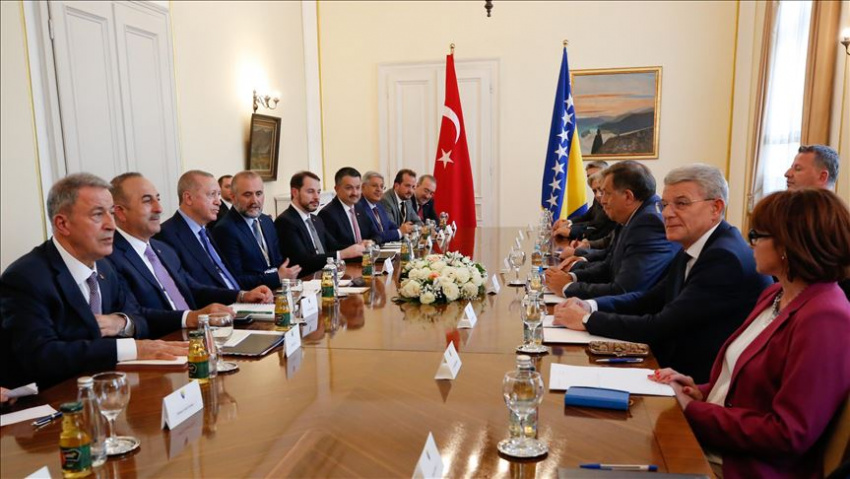The important strategic advantage that distinguishes Turkey from other Balkan countries is its geographical location. Among regional links in Balkan, the most important element and unchangeable strategic priority from Turkey’s point of view is those communities remained from Ottoman’s era and have tied their destiny to regional clout and authority of Turkey, continue to remain in their regions and thus be able to maintain their security. The situation has been coupled with important responsibilities for Turkey. In the meantime, it is considered to be the most important instrument to form and direct Turkey’s clout in Balkan region.
Turkey’s policy in Balkan is zero tension with its neighbors and then all out support to its friends. At first stage, Turkey linked its security policies with cultural ways and means. Then materialized its initiatives and new outlook to the region through holding trilateral meetings (Serbia, Bosnia and Croatia), economic integration, using its soft power (establishment of cultural centers in order to propagate Turkish language in the region), development of Turkish language universities in the region and quantitative increase in granting scholarships to students of the region.
In its foreign policy in Balkan, Turkey attempts to pay attention to active and effective diplomacy; that why it has always followed up regional balances. Having understood the internal challenges and risks of the region, Turkey tries to bring regional countries under its supremacy in a way. Pioneering of Turkey in joint projects that covers all Balkan, will lead to heavier weight of Turkey’s influence in the region.
In line with the expansion of the country’s cooperation with Balkan region, Turkish President Rejep Erdogan recently paid a visit to Bosnia where he held meetings and talks with the members of presidential council as well as ministers of foreign affairs, security and foreign trade, leader of Democratic Action Party, and the president of Bosnia Islamic Society. Improvement of bilateral cooperation, trade and economic relations, and ties among the nations of the region were discussed and reviewed in the course of the visit. Both parties agreed during the visit that their citizens can travel to each other country with presenting their identification card afterwards. They also exchanged their views on the issue of Sarajevo – Belgrade highway construction and how the related problems could be solved.
Turkey attaches special importance to its trade relations with all Balkan countries including and among them Bosnia and Herzegovina. Trade volume between Bosnia and Turkey increased about 266 million Bosnian mark (the country’s currency) in 2022 compared with the last year. Bosnian exports to Turkey in 2022 also increased about four million mark, while imports from Turkey increased about 262 million mark compared with the last year. Turkey made more than 15% of total foreign investments in Bosnia in 2021. Trade volume between Bosnia and Turkey during the first six months of 2022 stood at 916.576 million mark.
Erdogan also considers the upcoming general election of Bosnia on October 2, 2022 as very important and stresses on transparency in Bosnian election. He assesses the effect of election on Balkan as important and sensitive. Šefik Džaferović, Chairman of the Presidency Council of Bosnia and Herzegovina underscores that Turkey and Bosnia have extraordinary friendly and brotherly relations. Milorad Dodik, the Serb member of the Presidency Council of Bosnia and Herzegovina also emphasizes that his meeting with Erdogan was among rare cases that members of Presidency Council had no differences of views or dispute about. There was never such an understanding among members of the presidency council as for the meeting with Erdogan.
In the course of the visit, Erdogan tried to show himself as the main supporter of Bosnia.
However, Erdogan’s trip was coupled with some oppositions. Fahrudin Radončić, the current president of the Union Party for a Better Future of Bosnia and Herzegovina reacted to the remarks made by Erdogan in Sarajevo. He believes that the big problem rests with Erdogan when he directly drives Bosniaks towards anti- West behaviors.
Bosnians Croats ethnical assembly also reacted to Erdogan’s remarks when he opposes to inflict reforms on Bosnian election law by Christian Schmidt, High Representative for Bosnia and Herzegovina. From the assembly point of view, Erdogan’s support extended to pioneer circles of Bosniaks and his messages are anti-democracy and Western system, as well as an encouragement for extremist policies of Bosniaks, that expedites anti-Dayton Accords trends and deepens distrust among ethnical groups that constitute Bosnia and Herzegovina.
In his Sep 8th visit to Croatia and meeting with President Zoran Milanović, Turkish President Erdogan criticized Dayton Peace Accords. He believes that Dayton Accords did not provide any solution for Bosnia and is not an accord that brings any solution for Bosnia. After his meeting with Erdogan, Croatian President emphasized that Croatia and Turkey have different stances on the reforms of the Bosnian election law. It is now longer than a year since Croatian government has made effort to rectify some injustices and blatant violations of Dayton Peace accords which is the basis of peace and applicability of Bosnia.
Croatian President who criticizes the role of Christian Schmidt, High Representative for Bosnia and Herzegovina substantiates that his appointment was without the consent of all United Nations Security Council members. Croatia is looking for explanations and measures in connection with the role of High Representative for Bosnia and Herzegovina.










0 Comments